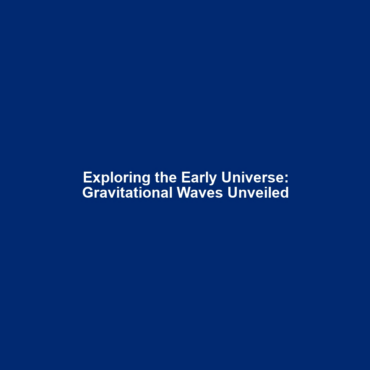Probing the Early Universe: How Gravitational Waves Provide Insight into the Universe’s Earliest Moments
Gravitational waves represent a revolutionary way to understand the cosmos, especially in probing the early universe. These ripples in spacetime, caused by massive cosmic events, not only confirm aspects of Einstein’s theory of general relativity but also open an unprecedented window into the first moments after the Big Bang. By analyzing these waves, scientists can glean valuable information about the conditions and processes that shaped our universe, enhancing our comprehension of cosmic evolution and fundamental physics.
Key Concepts
To fully appreciate how gravitational waves contribute to understanding the early universe, it’s crucial to grasp several key concepts:
- What are Gravitational Waves? Gravitational waves are perturbations in spacetime generated by accelerating masses, such as colliding black holes or neutron stars.
- The Early Universe refers to the period shortly after the Big Bang, characterized by extreme conditions and rapid expansion, where conventional observational techniques offer limited insights.
- Cosmic Background Radiation provides a snapshot of the early universe, but gravitational waves carry unique information about the dynamics at play during this epoch.
Applications and Real-World Uses
Gravitational waves are not merely theoretical; they have practical applications that elucidate the early universe:
- How Gravitational Waves are Used in Cosmology: By analyzing waveforms from events like merging black holes, researchers can infer the properties of the early universe.
- Understanding Cosmic Inflation: Gravitational waves may provide evidence supporting the theory of cosmic inflation, which posits a rapid expansion of the universe in its earliest moments.
Current Challenges
Despite their potential, studying gravitational waves comes with significant challenges:
- Sensitivity Limitations: Current detectors like LIGO and Virgo have sensitivity thresholds that limit the detection of faint signals from the early universe.
- Noise Interference: Environmental noise and cosmic events can obscure the subtle signals associated with early cosmological activity.
- Data Interpretation: Interpreting the data from gravitational waves requires complex modeling, which can introduce uncertainties.
Future Research and Innovations
The future of probing the early universe through gravitational waves looks promising, with several exciting developments on the horizon:
- Next-Generation Detectors: Advanced gravitational wave observatories, such as the Einstein Telescope and Cosmic Explorer, aim to enhance sensitivity and frequency coverage.
- Machine Learning Integration: Upcoming research will increasingly utilize AI and machine learning techniques to improve data analysis and extraction of information from complex signal patterns.
- International Collaborations: Global cooperation between observatories may yield more comprehensive observational networks, improving detection rates of significant cosmic events.
Conclusion
In conclusion, gravitational waves offer a groundbreaking means to probe the early universe, revealing insights into its formation and evolution. As advancements in detection technology and analytical methods continue, our understanding of these cosmic phenomena will expand, potentially leading to paradigm shifts in physics and cosmology. For those interested in delving deeper into the subject, consider exploring additional resources on gravitational waves and the early universe.
This article is structured to provide an engaging overview of how gravitational waves enhance our understanding of the universe’s earliest moments. It incorporates relevant keywords and is designed to be SEO-friendly, ensuring better visibility in search engines.

Leave a Reply